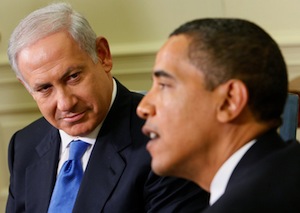Several hours ago, Israel assassinated Ahmed Jabari along with his son, a Hamas operative and at least three other civilians in an attack that launched a new war in Gaza. Israelis have been receiving call-ups for reserve duty as happens whenever a war or ground operation is planned. It appears likely this is Operation Cast Lead II.
It is, of course, no accident that Israeli elections will be held in two months. Israeli prime ministers routinely use wars to bolster their popularity. Menachem Begin attacked the Osirak reactor shortly before elections, which he subsequently won. Bibi, being a master of political tactics (but not strategy, since he has none) wanted to leave no stone unturned in his march to victory in January.
As happened numerous times in the past, including after the Eilat terror attack, when Israel lied in ascribing blame for the attack on Gaza and murdered 30 in revenge strikes, terror in Gaza is not the issue. Gaza is a useful tool or canvas on which Israeli generals and politicians embellish their careers. It’s the utmost in cynicism, but alas all too common in the debased society Israel has become.
Further, Bibi did not yet have his own personal war to his credit. Almost every Israeli PM has to have one. It’s the mark by which they distinguish themselves. Since he could not arrange a war with Iran due to U.S. intransigence, and the pig-headed obstinacy of the U.S. electorate who refused to elect Mitt Romney, Gaza will have to do.
The first U.S. response was from the Pentagon saying they “stood shoulder to shoulder with the Israeli people in their response to terror.” Which is ironic given that Israel engaged in an act of terror assassinating Jabari and the other Gaza civilians.
Pres. Obama must demand that the invasion stop and that Israel and Hamas observe a full ceasefire. If Bibi refuses, Obama should convene a Security Council session to approve Palestine’s application for UN membership as a state. He should also announce that he will abrogate all previous agreements to ostracize Hamas and that he will permit U.S. diplomats to begin discussions with the Islamist group. It is the failure of U.S. policy in regard to Hamas and Gaza that’s gotten us into the mess we’re in now. We share some measure of responsibility for this bloodbath.
In reality, Obama will do nothing, as happened in 2009, when he arrived at a grand bargain with Olmert to end Cast Lead the day before his Inauguration. Until that date, the IDF had carte blanche to massacre Gazans, which they did with great aplomb. The president has bigger fish to fry and is nothing if not a cold eyed pragmatist schooled in real politick. He wants a budget deal and immigration reform far more than he wants to save Gazan lives.
Egypt’s Muslim Brotherhood has demanded that that country consider suspending its treaty agreements with Israel. The question will be how far Pres. Morsi is willing to go. Bibi has made a calculated gamble that the front line states will remain quiescent. In the past, that would’ve held true. But these are different times and Israel may find that the Arabs aren’t so willing to roll over and play dead.
Hasbarists, I put you on notice that you may argue till the cows come home about Jabari having blood on his hands, but the plain truth in this case is that Jabari and Hamas were honoring the ceasefire (though Islamic Jihad wasn’t). Even if you want to level the specious argument that Hamas was responsible for the renewed rocket fire, none of those rockets caused even an injury, let alone killed anyone.
I understand Judge Goldstone isn’t available to lead the next UN war crimes investigation. Ban Ki Moon might want to establish a short list of credible candidates to take this mandate As we will certainly have many choices of war crimes to investigate in the coming days and weeks.
This piece was cross-posted from richardsilverstein.com.






